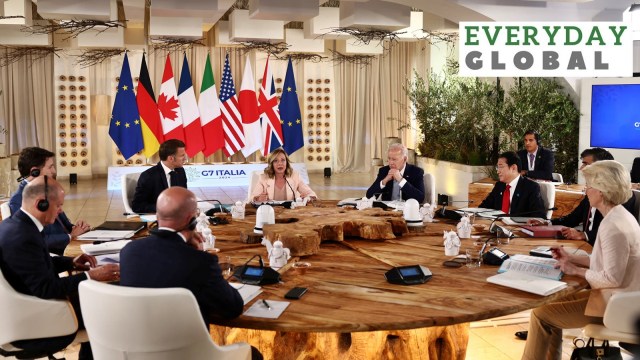Italy hosts G7 Summit: Why was the grouping created and what’s on the agenda this year?
Created as an economic forum of industrialised developed nations in the 1970s, the G7’s role has evolved over time. It has also come under criticism recently over its structure. Here is a brief look.
 Italy's PM Giorgia Meloni, U.S. President Joe Biden, French President Emmanuel Macron, Canada's PM Justin Trudeau, German Chancellor Olaf Scholz, Britain's PM Rishi Sunak, Japan's PM Fumio Kishida attend a session at the G7 summit at the Borgo Egnazia resort, in Savelletri, Italy, June 13, 2024. (REUTERS/Yara Nardi)
Italy's PM Giorgia Meloni, U.S. President Joe Biden, French President Emmanuel Macron, Canada's PM Justin Trudeau, German Chancellor Olaf Scholz, Britain's PM Rishi Sunak, Japan's PM Fumio Kishida attend a session at the G7 summit at the Borgo Egnazia resort, in Savelletri, Italy, June 13, 2024. (REUTERS/Yara Nardi)(Written by Saima Mehta)
The Group of Seven (G7) countries will meet for the Leaders’ Summit in Italy’s Apulia region between June 13 and 15, with the Mediterranean nation assuming the group’s presidency earlier this year.
It comes at a crucial time for the forum, as members Italy, Canada, France, Germany, Japan, the United Kingdom, the United States, and the European Union navigate complex global challenges. Prime Minister Narendra Modi will also attend the summit, with India having been invited as an Outreach Country. It will mark his first foreign visit in his third term as PM.
The agenda includes defending the “rules-based international system” amid Russia’s aggression towards Ukraine, addressing the Middle East conflict, and strengthening partnerships with developing nations, especially in Africa. Key priorities include migration, climate change, food security, and the implications of artificial intelligence (AI) for humanity.
Here is a brief look at the origins of G7, its evolution over the years and the major issues of discussion in this year’s summit.
What is the G7?
The G7 originated from a 1973 meeting of finance ministers and central bank governors in Paris, France. This meeting was convened in response to major economic challenges of at time – an oil crisis, rising inflation and collapse of the Bretton Woods system. Under this, the value of the US dollar was fixed against gold.
In turn, other global currencies pegged their values to the dollar. But over time, the dollar was seen to have been overvalued against the fixed rate. Therefore, a new mechanism had to be devised for exchange rates and this required global cooperation.
Thus, the idea of a forum was born, where major industrialised democracies could coordinate economic policies to address common challenges. The first G7 summit was held in 1975 in Rambouillet, France, bringing together the leaders of France, Germany, the United Kingdom, the United States, Italy and Japan. Canada joined the next year.
Since 1977, representatives of the European Economic Community, now the European Union, have also participated. Russia’s inclusion in 1998 expanded the group to the G8, but its membership was suspended in 2014 following its annexation of Crimea.
How the G7 has evolved and questions about its relevance
Over the years, the G7 has evolved from an economic forum to a platform which aims to address a range of global challenges. While it lacks a permanent administrative structure, the G7 rotates its presidency annually and the presidency serves as a temporary secretariat.
Concluding with a communiqué outlining political commitments, the annual summit influences global governance, agenda-setting and decision-making processes.
However, its relevance has been questioned in recent years as the combined share of its members in global GDP has fallen. An analysis from the think tank Bruegel (‘The G7 is dead, long live the G7’) said it declined from roughly 50% in the 1970s to around 30% in 2018. The economic growth of China, India and other emerging economies has led to calls for a more representative global governance structure.
In comparison, the G20, which was established in response to the 2008 financial crisis, is seen as a more inclusive forum. The Bruegel analysis argued that the G20’s creation proved the G7’s inability to handle-modern day crises. But due to its size, the authors claimed that the G20 was “too big and heterogeneous to make decisions when not mired in deep crisis”.
They proposed a reconfigured G7+, which would include a common euro-zone representative and make space for China, India, and Brazil, thereby better reflecting the current global economic landscape in terms of both GDP and population.
There are also concerns about the G7’s ability to achieve cooperation within the group. Then US President Donald Trump was often at odds with other G7 leaders and at the 2019 summit, he skipped a meeting on climate issues.
Despite its challenges, the G7 has achieved several milestones and played a crucial role in shaping international policies. It has been instrumental in coordinating economic policies, promoting free and fair trade practices, shaping global governance issues, and supporting security cooperation and development assistance.
What’s on the agenda at the 2024 G7 summit?
The upcoming G7 summit in Italy holds significance for several reasons.
First, it aims to coordinate economic policies to stabilise the global economy amidst concerns over inflation and trade tensions.
Second, the summit will focus on addressing climate change by discussing strategies to reduce carbon emissions and promote sustainable energy sources. With climate records tumbling recently, collective action is key to addressing such problems.
Third, in light of the lessons learned from the Covid-19 pandemic, the G7 will prioritise global health initiatives, including pandemic preparedness and vaccine distribution. Additionally, the summit will address geopolitical tensions, including relations with China and Russia, and ongoing conflicts with global implications.
Finally, the G7 will explore the regulation of emerging technologies, data privacy, and cybersecurity to ensure they benefit global development.
The author is an intern with The Indian Express.
Photos



- 01
- 02
- 03
- 04
- 05



































